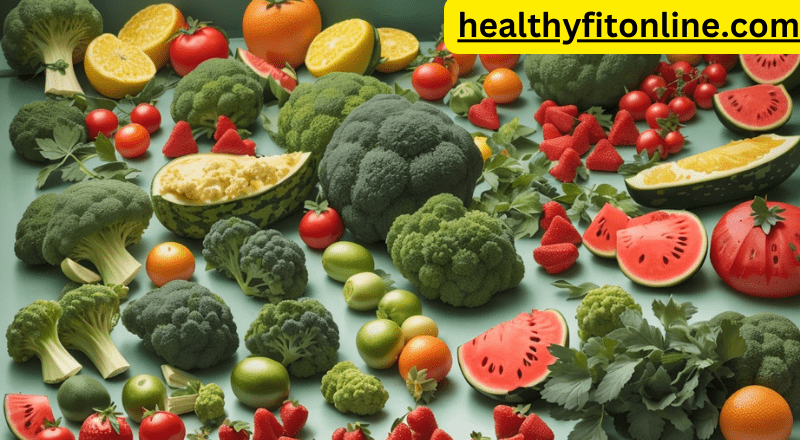The notion of foods with zero calories may sound too good to be true in a world obsessed with calorie counting and dieting. After all, can you really consume certain foods without any caloric impact on your body? In this article, we will explore the intriguing topic of “38 Foods That Contain Zero Calories” and shed light on whether this claim is a myth or a reality.
Introduction
The quest for healthier eating habits has led to a surge in interest surrounding zero-calorie foods. These are often touted as the holy grail for weight watchers and health-conscious individuals. But do these foods truly exist, and if so, what are they?
Understanding Zero-Calorie Foods
Zero-calorie foods, also known as negative-calorie foods, are those that supposedly require more energy to digest than they provide. In other words, the act of consuming these foods burns more calories than they contribute, theoretically resulting in a net calorie deficit.
The Role of Water and Fiber
Many zero-calorie foods are primarily composed of water and fiber. These elements play a crucial role in making you feel full without adding significant calories. Let’s delve into the list of 38 zero-calorie foods and explore their unique qualities.
The List of 38 Zero-Calorie Foods
Leafy Greens
Leafy greens like lettuce, kale, and spinach are rich in nutrients and fiber while being exceptionally low in calories.
Cucumbers
Cucumbers are hydrating and low in calories, making them an ideal snack for those looking to cut down on calorie intake.
Celery
Celery is a classic example of a low-calorie vegetable that offers a satisfying crunch.
Tomatoes
Tomatoes are not only versatile but also low in calories, making them a staple in many diets.
Zucchini
Zucchini is a versatile vegetable that can be enjoyed in various dishes while providing few calories.
Broccoli
Broccoli is nutrient-dense and low in calories, making it an excellent addition to a healthy diet.
Asparagus
Asparagus is not only delicious but also low in calories and packed with essential nutrients.
Cauliflower
Cauliflower can be a great replacement for higher-calorie ingredients in recipes.
Watermelon
Watermelon is not only refreshing but also low in calories, making it a favorite summer treat.
Strawberries
Strawberries are sweet, low in calories, and packed with antioxidants.
Oranges
Oranges are a citrus delight, low in calories, and high in vitamin C.
Grapefruit
Grapefruit is known for its potential to aid in weight management due to its low calorie content and other health benefits.
Apples
Apples are not only low in calories but also high in fiber, making them a filling snack.
Berries
Berries like blueberries, raspberries, and blackberries are not only low in calories but also rich in antioxidants.
Carrots
Carrots are crunchy, low-calorie vegetables that are perfect for snacking.
Peppers
Peppers, whether red, green, or yellow, are low in calories and add flavor to your dishes.
Spinach
Spinach is a nutrient powerhouse and low in calories, making it a superfood.
Lemons
Lemons are low in calories and can be used to flavor water and dishes.
Onions
Onions, when used in moderation, are low in calories and add depth to your recipes.
Beets
Beets are not only colorful but also low in calories, offering unique health benefits.
Garlic
Garlic is low in calories and adds a burst of flavor to your meals.
Brussels Sprouts
Brussels sprouts are low in calories and packed with vitamins and minerals.
Radishes
Radishes are crunchy, low in calories, and a great addition to salads.
Cabbage
Cabbage is low in calories and can be used in various dishes.
Kale
Kale is a nutrient-rich leafy green that is also low in calories.
Turnips
Turnips are low in calories and can be used in a variety of dishes.
Cilantro
Cilantro is a flavorful herb that can be used to add zest to your meals.
Parsley
Parsley is low in calories and can be used as a garnish or ingredient in recipes.
Mushrooms
In some dishes, mushrooms can be used as a low-calorie meat substitute
Eggplant
Eggplant is a versatile vegetable that is low in calories and perfect for grilling or roasting.
Peas
Peas are high in protein and fiber while being low in calories.
Green Beans
Green beans are low in calories and make for a nutritious side dish.
Ginger
Ginger is a flavorful spice that is low in calories and offers various health benefits.
Paprika
Paprika is a spice that adds color and flavor to your dishes without adding many calories.
Chives
Chives are low in calories and can be used as a garnish or ingredient in recipes.
Thyme
Thyme is a versatile herb that is low in calories and adds flavor to your dishes.
The Benefits of Incorporating Zero-Calorie Foods
The inclusion of zero-calorie foods in your diet can provide several benefits. They can help you feel full, stay hydrated, and provide essential nutrients without significantly increasing your calorie intake.
Are These Foods Truly “Zero Calories”?
While these foods are incredibly low in calories, it’s essential to note that they do contain some calories. However, the number of calories they provide is so minimal that the energy expended during digestion may offset the calorie intake.
Zero-Calorie Foods into Your Diet
Incorporating these foods into your diet is relatively easy. You can enjoy them as snacks, add them to salads, or use them as ingredients in various recipes.
Zero-Calorie Foods in Weight Management
Zero-calorie foods can be valuable tools in weight management, as they can help you control your calorie intake while staying satisfied.
Conclusion
In the pursuit of a healthier lifestyle, zero-calorie foods offer a promising option. While they may not be entirely calorie-free, their low-calorie content and numerous health benefits make them a valuable addition to any diet.
FAQs
- Are zero-calorie foods suitable for weight loss?
- Zero-calorie foods can be helpful in weight loss by reducing calorie intake and promoting satiety.
- Can I eat zero-calorie foods in unlimited quantities?
- While they are low in calories, moderation is key to a balanced diet.
- Are there any side effects to consuming zero-calorie foods?
- Consuming zero-calorie foods in moderation is generally safe and may have health benefits.
- Can zero-calorie foods replace regular meals?
- Zero-calorie foods should be part of a balanced diet and not a sole replacement for meals.
- Do zero-calorie foods taste bland?
- Zero-calorie foods can be delicious when prepared and seasoned properly.
Incorporating zero-calorie foods into your diet can be a smart choice for both your health and weight management goals. Remember to enjoy them as part of a well-balanced diet and in moderation.

